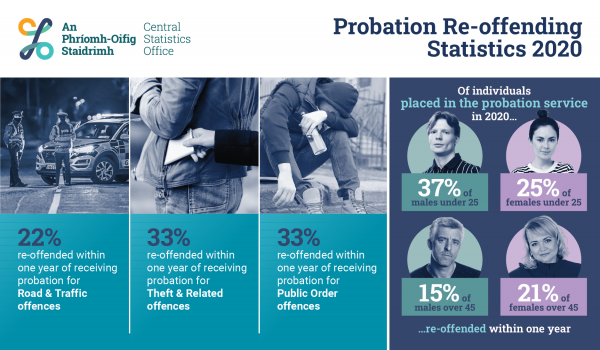Probation recidivism 2020 cohort
29th November 2024
Statistics have been published by the Central Statistics Office (CSO) on rates of reoffending for individuals sentenced to probation up to and including 2020. The most recent reference year included in this data is 2020 because a minimum of three years is needed to establish a re-offending rate: one year for potential re-offences to take place, and two years for re-conviction. For more on how recidivism is measured by the CSO, visit the CSO website.
The data indicates that there has been a slight increase in rates of reoffending from the previous year, standing at 27% in 2020 after a reduction in 2019 where it stood at 25% as opposed to 28% in 2018.
Probation Orders Issued in 2020
Data provided by the Probation Service indicates there were on average significantly less Probation orders (-35%) issued in 2020 when compared with studies from previous years. This was due to the national measures taken in relation to COVID-19 during the reference period.
Re-Offending Rates
Overall, probation re-offending estimates indicated a slight increase in re-offending by probationers between those that received a probation order between 2019 and 2020, although the one-year re-offending rate for 2020 (27%) was the second lowest re-offending rate measured since 2008 when the first estimates of probation re-offending were calculated. The year-on-year increase in re-offending between 2019 and 2020 was mostly due to a rise in the re-offending of people who received probation for offences relating to Controlled Drug (23%) or Road Traffic (22%) related offences. In both these groups, there was a four percentage point increase in the re-offending rate compared with 2019. The analysis also shows that the re-offending levels amongst adult males under the age of 25 years (37%) remains significantly higher than the equivalent rate for adult females (25%) of the same age.
See Probation Re-offending Statistics 2019 for further information on the statistics relating to re-offending by people who received probation during 2019.
Re-Offending Within One Year
The highest levels of re-offending for those who received probation in 2020 was among young adults. Almost four in ten (37%) of males and a quarter (25%) of females under the age of 25 years re-offended within a year. In contrast, 15% of males aged 45 to 64 years and one-fifth (21%) of females aged 45 years and over re-offended in the same period after receiving probation, although this age group accounted for just 484 (14%) of the total 3,478 people who received probation during 2020 and who were included in the study.
Re-Offending Within Three Years
The three-year probation re-offending estimates provide a more comprehensive estimate of the levels of re-offending. To calculate this rate, the CSO needs a minimum of three years to establish a re-offending incident and a further two years to allow for the associated court conviction to elapse. In 2018, almost half (45%) of probationers re-offended within three years of receiving their probation order. This was two percentage points down on 2017 (47%) and 10 percentage points less than 2008 levels when the three-year re-offending rate was more than half (55%).
Regional Differences
There was a significant difference in the re-offending rates regionally ranging from just over a fifth (21%) in the West (consisting of Galway, Mayo, and Roscommon) and the Midlands (Laois, Longford, Offaly, and Westmeath), to almost a third (31%) in the South-West region ( Cork and Kerry). At county level, Donegal (10%) and Wicklow (12%) had the lowest one-year re-offending rate while Monaghan (35%) had the highest re-offending levels among people who were issued with probation in 2020."
Key findings
-
Over one-third (37%) of adult males aged under 25 years who received probation orders in 2020 re-offended within a year of receiving probation. In comparison, one-quarter (25%) of young adult females re-offended during the same period.
-
There were increases between 2019 and 2020 in the re-offending rate of people serving probation for offences related to Assault (+5%), Controlled Drug (+4%), and Road & Traffic (+4%) related offences.
-
Regionally, the highest level of re-offending (31%) involved probationers from the South-West (Cork and Kerry) region. In the Dublin region, where the highest number of probationers lived (1,058 of 3,478), 27% of probationers re-offended within a year.
-
The highest number of probation orders were issued in 2020 to people who committed offences related to Controlled Drug offences (605 of 3,478). Just over one-fifth (23%) of these people were convicted of a re-offence within a year of receiving their probation.
-
Just under two-thirds (65%) of the re-offending by people who received a probation order in 2020 took place in just three of the sixteen offence categories: Public Order (28%), Controlled Drug (21%), and Theft (16%).
-
During a longer period (three-years) after receiving a probation order in 2018, almost half (45%) of people committed at least one offence for which they received a conviction.
View the data on Probation Reoffending.





